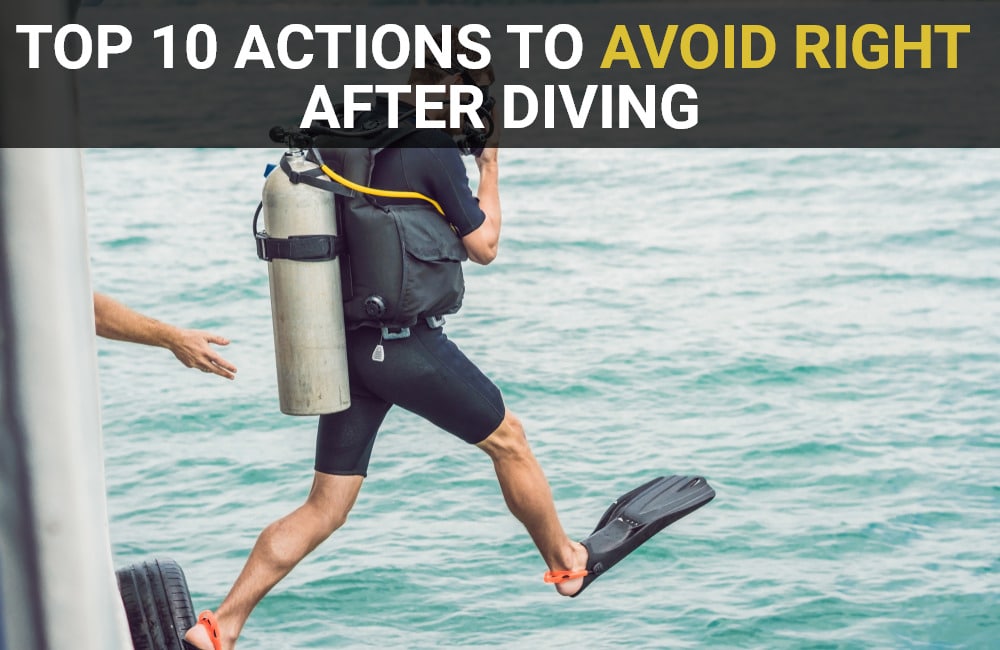Blog
Top 10 Actions to Avoid Right After Diving
Diving is an adventurous activity that can be enjoyed by anyone who knows how to swim. The feeling of being underwater and exploring its beauty is truly unrivaled. While diving can provide a great experience, taking certain precautions before and after the dive is essential to ensure your safety. This blog post discusses the top 10 actions to avoid right after diving.
Flying After Diving
After a dive, avoiding air travel for a certain period is best to reduce the risk of decompression sickness or “the bends.” Ascending to high altitudes can put added pressure on your body. Flying soon after a dive increases the risk of decompression sickness (DCS), which can be fatal if not treated promptly. DCS occurs when gas bubbles form in the body due to pressure changes during a flight, which can cause severe pain and even death if left untreated. To avoid this, it’s recommended that divers wait at least 12-24 hours before taking any flights following their dives.
Mountain Climbing or Driving
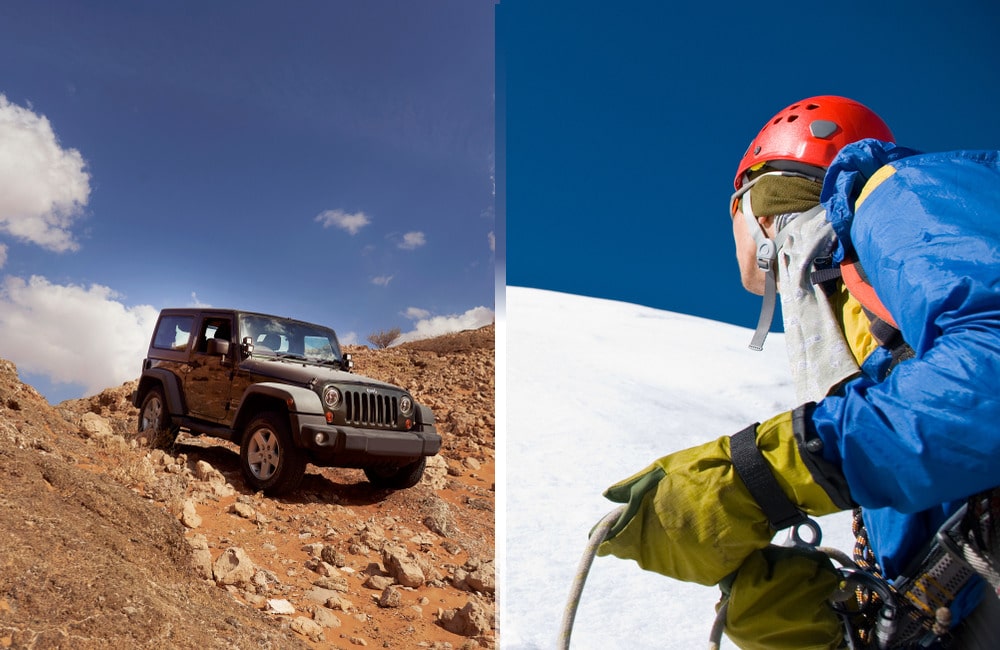
Other actions you must avoid after diving is mountain climbing, driving to high altitudes, venturing to high altitudes, or engaging in activities that involve significant altitude changes shortly after diving is discouraged. Both mountain climbing and driving through mountainous terrain can stress your body and exacerbate decompression-related issues.
This is because the air pressure at higher altitudes is much lower than it is underwater, which can cause the formation of gas bubbles in the body. These bubbles can lead to DCS if they are not allowed to dissipate slowly over time. D divers should wait at least 24 hours before climbing mountains or driving up a steep road following their dives to avoid this. It is better to opt to relax at sea level before attempting any activities that involve rapid elevation changes.
Ziplining After Diving
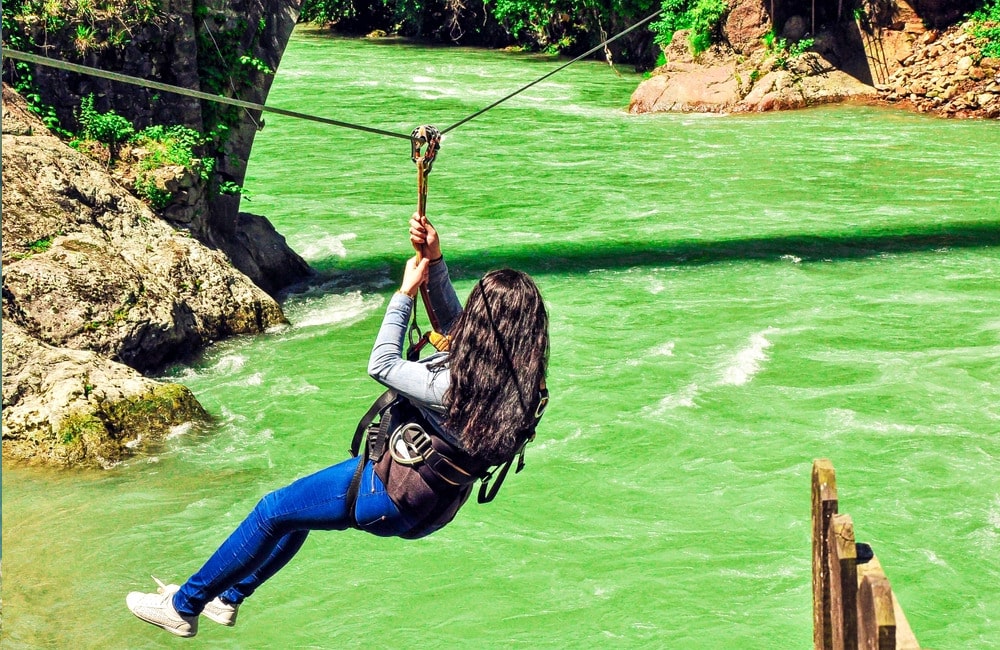
Ziplining might be thrilling, but it’s best to avoid it right after diving. Similar to flying, ziplining can cause a rapid change in altitude, potentially leading to decompression sickness. Ziplining is an activity that involves a person sliding down from a high point to a lower one. It can be a fun and thrilling experience. Still, it should be avoided after diving because it exposes the person to sudden pressure changes, which can cause DCS if not done carefully. To avoid this, divers should wait at least 24 hours before participating in any zipline activities following their dives.
Deep Tissue Massage
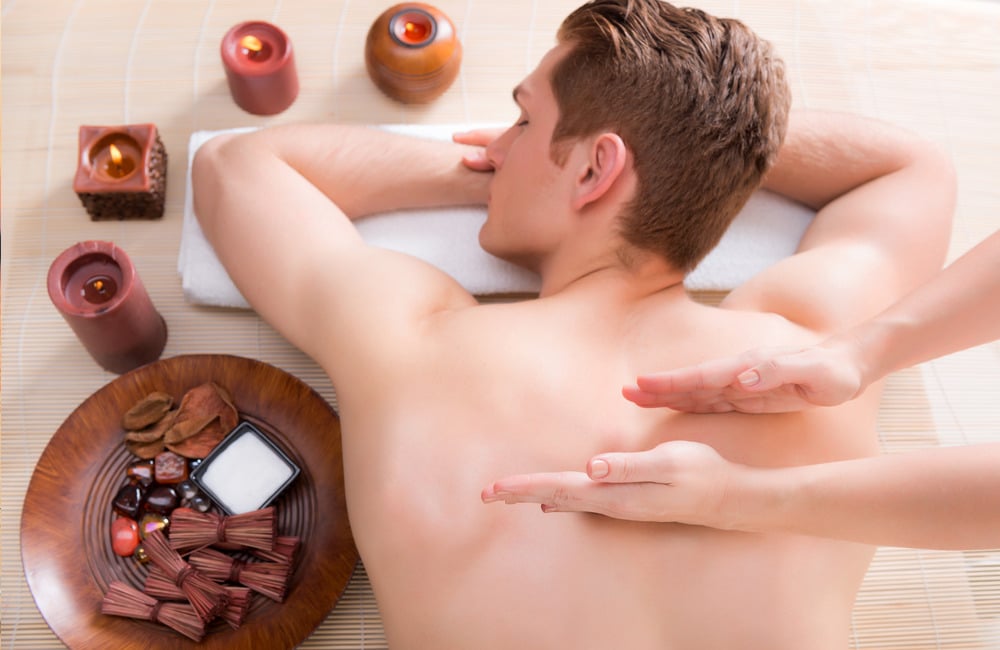
Deep tissue massages should also be avoided after diving because they can cause the gas bubbles forming in the body to expand and move to other parts of the body, which can lead to DCs.
Though tempting, soaking in a hot tub or taking a hot shower immediately after diving is not advisable. Stick to a warm shower and let your body gradually adjust to the temperature change. As a best practice, divers should wait at least 24 hours before taking part in any deep tissue massage activities following their dives.
Relaxing in a Hot Tub or Shower
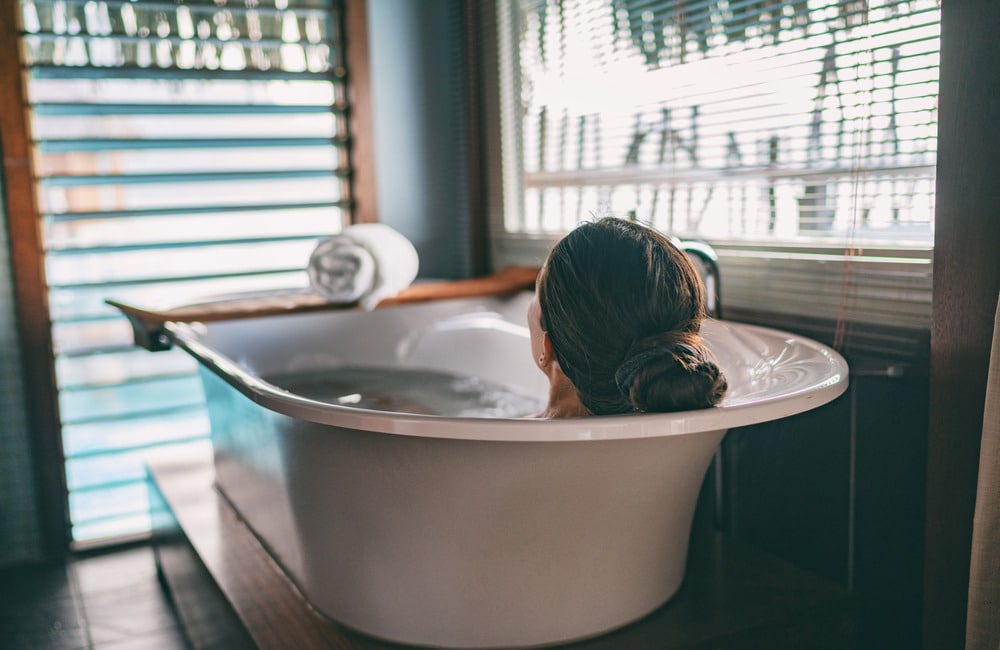
Though tempting, soaking in a hot tub or taking a hot shower immediately after diving is not advisable. The heat and pressure can promote the formation of nitrogen bubbles in your body, which could be dangerous. The heat from a hot tub soak can make the gas bubbles that form in the body expand and move to other parts of the body, which could lead to DCS. Again, just take a warm shower and let your body gradually adjust to the temperature change. Wait at least 24 hours before entering hot tubs following a deep dive.
Excessive Drinking
After a thrilling and unforgettable dive, the allure of celebrating with friends may tempt you. Still, it is crucial to exercise caution regarding alcohol consumption. While reveling in the joy of your underwater adventure, it’s essential to keep in mind the potential consequences of excessive drinking. Consuming alcohol after diving can harm your body, jeopardizing your immediate well-being and long-term health.
Dehydration is a significant concern following a dive, and alcohol exacerbates this issue. It can lead to a further loss of fluids from your body, impeding the rehydration process that your system desperately needs post-dive. As your body strives to eliminate nitrogen and adjust to the changing pressures, adequately hydrated is essential to facilitate these recovery mechanisms.
Moreover, alcohol’s effects on cognitive functions should not be underestimated. It impairs judgment and coordination, making it dangerous to indulge in any activities that demand focus or precision, especially after a physically demanding dive. Making sound decisions and staying alert is crucial for diver safety, even after resurfacing from the depths.
To ensure your safety and health, it’s wise to wait at least a day after diving before considering any alcoholic indulgence. This timeframe allows your body to recover from the dive adequately. It restores its balance, minimizing the risk of dehydration and optimizing nitrogen elimination.
Freediving After Scuba Diving
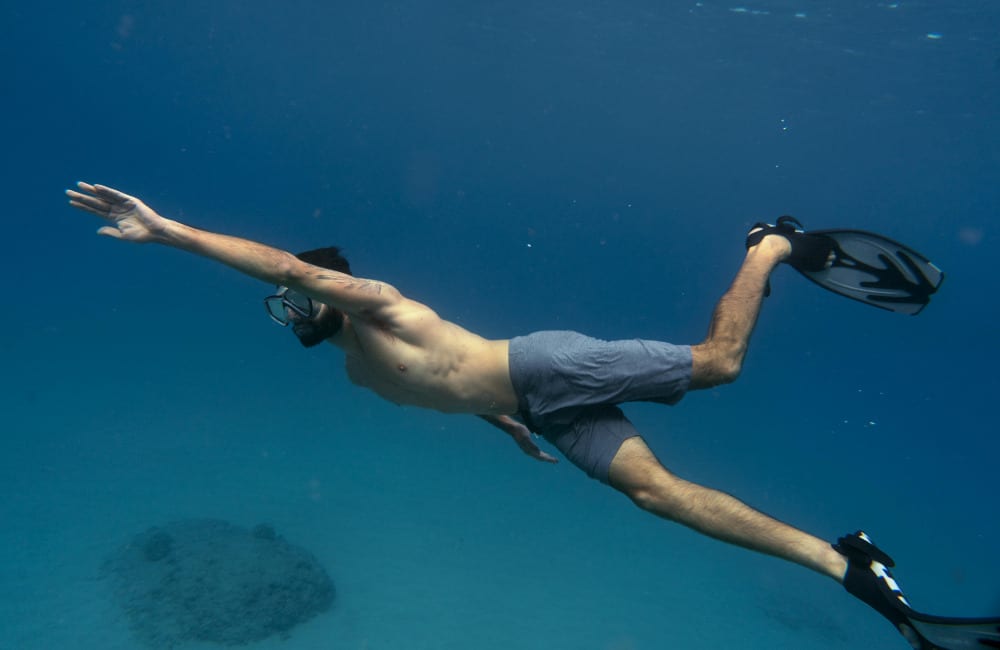
Freediving involves diving without the assistance of breathing equipment. Mixing scuba diving with freediving immediately afterward can increase the risk of shallow water blackout or hypoxia. Thus, freediving or swimming without breathing equipment should also be avoided after scuba diving. Such an activity can result in a sudden decrease in pressure that may lead to DCS. To avoid this, divers should wait at least 24 hours before attempting any further activities. Give your body ample time to off-gas nitrogen before attempting freediving activities.
Exercising After Diving
Physical exertion right after diving can strain your body and hinder the off-gassing of nitrogen. Avoid intense workouts or activities that may lead to shortness of breath or fatigue for a few hours after your dive.
Strenuous exercises such as running or lifting weights should also be avoided after diving, as with other activities that you should avoid after a scuba dive, wait at least 24 hours before engaging in any strenuous exercise activities following their scuba dives.
Skipping Your Surface Interval
A surface interval between repetitive dives allows your body to eliminate excess nitrogen and reduces the risk of decompression sickness. Never skip this essential recovery time, as it is crucial to maintaining your safety during subsequent dives.
It’s essential to set up and always stick to your planned surface interval and not skip it. This is because the surface interval is a crucial time for the body to adjust to normal pressure so that any gas bubbles can dissipate slowly over time. To avoid DCS, follow your dive computer’s recommendation for how long you should take as a surface interval after each dive.
Ignoring Your Body
One of the most critical actions to avoid after a dive is ignoring signs of discomfort or symptoms of potential decompression illness. Whether it’s fatigue, dizziness, joint pain, or skin rashes, you must address any discomfort or symptoms you experience immediately. These symptoms may be minor, but they can be the early signs of decompression illness, a severe and potentially life-threatening condition. Seeking immediate medical attention can help you receive the proper treatment to recover fully. Ultimately, by being proactive and attentive to your body’s signals after a dive, you can safely enjoy the exciting world of scuba diving.
Activities that are safe after diving
After a fulfilling diving experience, taking proper care of your body becomes paramount, and it involves embracing a holistic approach to relaxation and well-being. One of the essential aspects is giving yourself the time to unwind and let the tranquility of the ocean settle within you. Relaxation and hydration are key components that play a vital role in post-dive recovery. You can achieve this by indulging in light walking or gentle stretching, which rejuvenates your muscles and promotes healthy blood circulation throughout your entire system. This, in turn, aids in efficiently eliminating nitrogen from your body, reducing the risk of decompression-related issues.
Moreover, the post-dive period offers a splendid opportunity to bond with like-minded individuals who share your passion for underwater exploration. Engaging in heartfelt conversations and sharing your thrilling dive experiences with fellow enthusiasts fosters camaraderie and enriches your memories of the adventure. Don’t forget to revisit those awe-inspiring moments by perusing through your underwater photographs, reliving every captivating second of your dive. As you immerse yourself in the breathtaking sights captured below the surface, you’ll find yourself transported back to that enchanting underwater realm, savoring the beauty and serenity of the deep.
Listening to your body is an art worth mastering, as it is a reliable guide to understanding its needs and limitations. Should you experience discomfort or unease after diving, don’t hesitate to seek professional medical advice. Paying heed to these cues enables you to address any potential issues promptly, safeguarding your health and allowing you to dive another day.
So, as you bid adieu to the wondrous underwater world, carry with you the memories of your underwater escapades and the wisdom of safeguarding your well-being. Embrace the post-dive rituals that nourish your body, mind, and soul, cherishing the moments and camaraderie with fellow divers. Let each dive be a transformative experience, instilling a profound respect for the oceans and a commitment to diving responsibly. With safety as your compass and mindfulness as your anchor, every dive will be a gratifying journey, unveiling the hidden wonders of the ocean blue. Happy diving!
